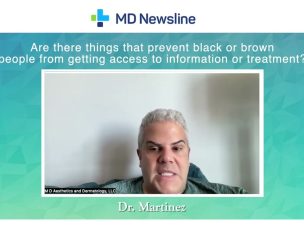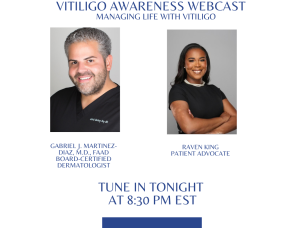Vitiligo
Topical Formulation With MIA-Inhibitory Peptides in Recalcitrant Vitiligo
Melanoma Inhibitory Activity (MIA) is an effective therapeutic target for recalcitrant non-segmental vitiligo, in combination with oral antioxidant medications and UVA or sun exposure. Vitiligo is characterized by acquired autoimmune depigmentation of the skin. Studies based on an animal model have suggested the involvement of melanoma inhibitory activity (MIA) protein in vitiligo pathogenesis. MIA protein...
Vitiligo Webcast Recap: Exploring Vitiligo Treatment Options
On November 17th, 2022, in our recent webcast titled “Exploring Vitiligo Treatment Options”, Dr. Brittany Oliver, a Board-Certified Dermatologist, answers questions from Dr. Pete Thomas on treatment options for Vitiligo. Dr. Brittany Oliver is an expert in Vitiligo and has knowledge of various treatment options. The webcast covered many topics surrounding treatment. To watch this...
Dr. Martinez-Diaz on Conditions Associated with Vitiligo
In this interview, Dr. Martinez-Diaz discusses other conditions associated with vitiligo. He explains how it manifests in a variety of contexts and what other conditions it can be associated with. MD Newsline: Are there any other conditions associated with vitiligo? Dr. Martinez-Diaz: So, vitiligo can be associated with other autoimmune disorders, namely anemia, thyroid problems,...
Things That Prevent Black & Brown People From Getting Access to Treatment
Dr. Martinez-Diaz discusses the things that prevent Black and Brown people from getting access to treatment for their vitiligo. He talks about how these conditions can be prevented, as well as what steps are being taken to ensure that everyone has equal access to treatment. MD Newsline: Are there things that prevent Black or Brown...
What Factors Affect The Severity and Rate of Vitiligo Progression
Vitiligo is a disease that causes patches of skin to lose pigment. It’s not contagious and isn’t life-threatening, but it can be very difficult to live with. In this interview, Dr. Martinez-Diaz discusses what factors affect the severity and rate of vitiligo progression. MD Newsline: What factors affect the severity and rate of vitiligo progression?...
Rate of Vitiligo Spread Alter Depending On Each Patient
Vitiligo is a condition in which patches of skin lose their pigment and appear white. It can be acquired or inherited. In this interview, Dr. Martinez-Diaz discusses whether the rate of vitiligo spread alters depending on each patient’s genetics or other factors. MD Newsline: Does the rate of vitiligo spread alter depending on the type...
Vitiligo Webcast Recap: Managing Life With Vitiligo
MD Newsline hosted a webcast on October 31st titled Managing Life with Vitiligo which featured Dr. Martinez-Diaz and patient advocate Raven King. Vitiligo is a skin condition where the pigment of the skin is lost, leaving white patches on the body. It can be very difficult for people to cope with this condition but with...
Understanding the Efficacy of Phototherapy for Vitiligo
Phototherapy is one of the most effective ways to treat vitiligo. This study analyzed the efficacy of phototherapy in detail, in particular as it relates to combination therapies. When treating patients with vitiligo, healthcare providers can utilize various therapeutic options, including surgical techniques, drugs, and phototherapy. Among the different wavelengths of phototherapy available, narrowband UVB...
Adjusting with Vitiligo - James McLeod
James Mcleod is a patient advocate who has vitiligo. In this interview, he tells us what it’s like to adjust to managing vitiligo, and he shares his advice for other people living with the condition. Describe how you have to adjust to managing Vitiligo. James Mcleod: I knew I had a visual difference and there...
More Medical News













